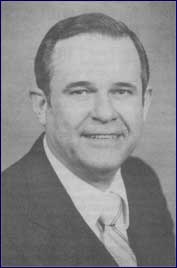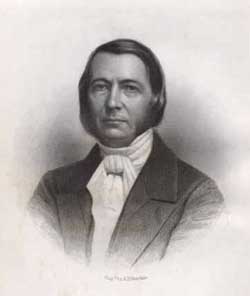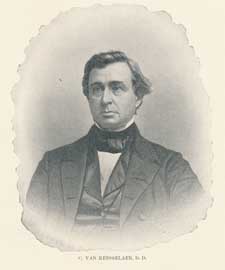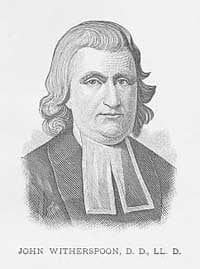Truly a Historic Day
The big announcement for a continuing Presbyterian Church outside the Presbyterian Church, US was made on August 11, 1971 at the Journal Day gathering. Much prayer and planning had gone into this point. The July 15 devotional spoke of the first strategy meeting earlier in the year. Now on this day was the unveiling of the whole plan, with those who were willing to take the lead for this historic departure.
Jack Williamson announced that the four conservative organizations — The Presbyterian Journal, Concerned Presbyterians, the Presbyterian Evangelistic Fellowship, and Presbyterian Churchmen United — had each officially given the impetus by naming representatives to serve as a Steering Committee “for the continuation of a Presbyterian Church loyal to the Scriptures and to the Reformed faith.” All four organizations, instead of continuing to represent conservative Christians inside an apostate denomination, had reached an agreement “to accept the apparent inevitability of division in the Presbyterian Church US caused by the program of the radical ecumenists, and to move now toward a continuing body of congregations and presbyteries loyal to the Scriptures and the Westminster Standards.”
The Presbyterian ruling elder continued, “We sincerely believe that the Holy Spirit is leading us in this direction. We know that any result which is pleasing to Almighty God shall not be accomplished by our might, nor by our power but by His Spirit. There, we urge and implore you to undergird this effort daily with much fervent prayer that God will fill us with His Holy Spirit to guide us in this tremendous undertaking…This is truly a history day for all of us. We resolutely set our faces in a new direction. We shall, with God’s help, preserve for future generations the witness of our historic faith, that faith once delivered to the saints, to the glory of our King and Head, our Lord and Savior, Jesus Christ.”
The Steering Committee consisted of the following: Donald Patterson, Chairman, James Baird Jr., Leon F. Hendrick, William E. Hill, Kenneth Keyes, John E Richards, John R. Richardson, Kennedy Smartt, G. Aiken Taylor, S.A. White, Ben Wilkinson, and Jack Williamson.
(This contributor is thankful for the book “To God all Praise and Glory” by Paul Settle, for the above information)
Words to live by: When tough decisions have to be made, God provides faithful and courageous men to stand up in the gap for His church. Such were the above mentioned names who agreed to serve on the Steering Committee for a continuing Presbyterian Church faithful to the Scriptures, the Reformed Faith, and the Great Commission of Jesus Christ. Today, the Presbyterian Church in America continues her ministry to a watching world because of their historic stand. We should praise God for them and honor them because they honored God.
 AN ANNOUNCEMENT
AN ANNOUNCEMENT
Made at Asheville, N.C. on August 11, 1971
by Dr. Donald B. Patterson [pictured at left]
It is my privilege to announce to you that the men on the platform with me now have been officially named as representatives from their respective boards to a steering committee. They represent the Presbyterian Evangelistic Fellowship, the Presbyterian Journal, the Presbyterian Churchmen United and the Concerned Presbyterians. Here is visible proof of the unity of conservatives working toward a common goal.
These groups have reached a consensus to accept the apparent inevitability of division in the Presbyterian Church US caused by the program of the radical ecumenists, and to move now toward a continuing body of congregations and presbyteries loyal to the Scriptures and the Westminster Standards.
This steering committee has been charged with the responsibility of developing and implementing a plan for continuation of a Presbyterian Church loyal to the Scriptures and Reformed faith, recognizing that the Sovereign Holy Spirit may be pleased so to revive our Church as to make revisions in the plan necessary.
This committee held its organizational meeting last night. I was elected its chairman; Jim Baird, its vice-chairman; and Kennedy Smartt, its secretary.
This plan anticipates the involvement of every single congregation in our Church that is interested in preserving the historic witness of our faith. You will be given the opportunity to participate soon.
We sincerely believe that the Holy Spirit is leading us in this direction. We know that any result which is pleasing to Almighty God shall not be accomplished by our might, nor by our power but by His Spirit. Therefore, we urge and implore you to undergird this effort daily with much fervent prayer that God will fill us with His Holy Spirit to guide us in this tremendous undertaking.
This is truly a historic day for all of us. We resolutely set our faces in a new direction. We shall, with God’s help, preserve for future generations the witness of our historic faith, that faith once delivered to the saints, to the glory of our King and Head, our Lord and Saviour, Jesus Christ.
THE STEERING COMMITTEE
Rev. Donald Patterson, Jackson, Miss., Chmn.
Rev. John R„ Richardson, Atlanta, Ga.
Rev. James Baird, Jr., Gadsden, Ala.
Judge Leon F. Hendrick, Jackson, Miss.
Rev. Kennedy Smartt, Hopewell, Va.
Rev. William E. Hill, Hopewell, Va.
Rev. G. Aiken Taylor, Asheville, N.C.
Mr. Kenneth S. Keyes, Miami, Fla.
Rev. John E. Richards, Macon, Ga.
Rev. Ben Wilkinson, Decatur, Ga.
Mr. S. A. White, V., Mebane, N.C.
Mr. Jack Williamson, Greenville, Alabama



